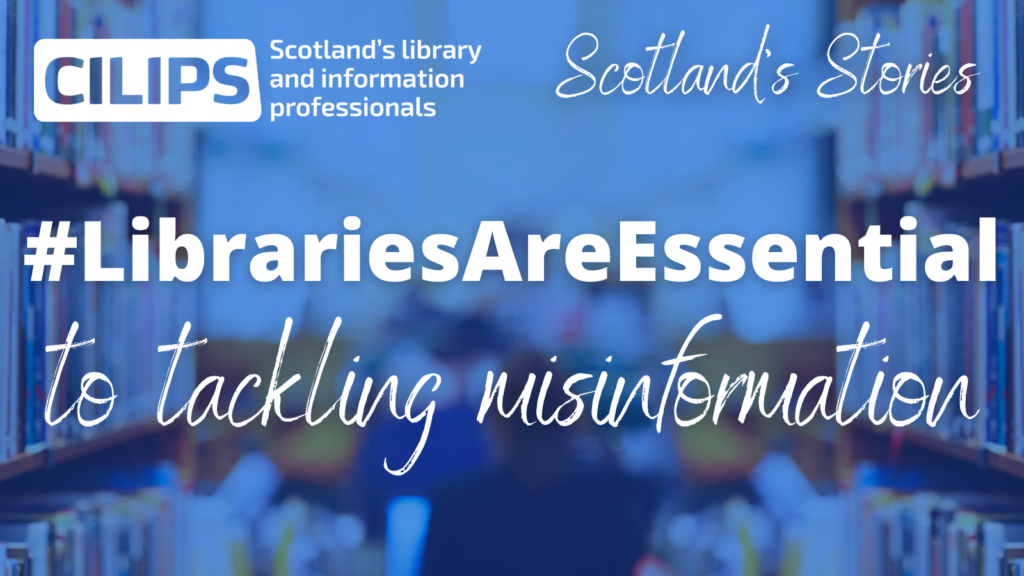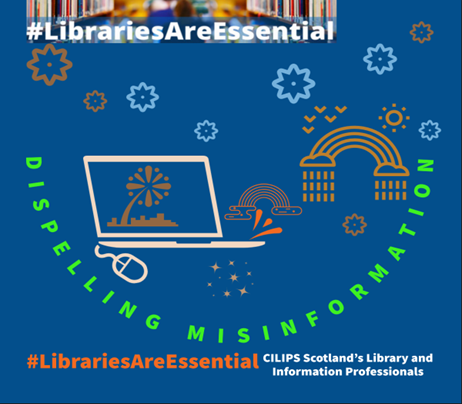
- Misinformation, the spread of false or inaccurate information, and disinformation, the spread of false information with the deliberate intent to deceive, are growing problems in the modern world with damaging consequences for mental wellbeing, physical health and even democracy itself. Read on to learn why libraries are an essential frontline defence against this threat…
- ‘The integrity of the public record as well as the safety and intellectual freedom of the civilian population are pre-requisites of any Nation State that aspires to legitimacy or credibility within the international community. Librarians, archivists and information professionals play a vital role in promoting reading, literacy and access to information for the citizens and communities they serve. It is essential that they are permitted to continue this work in safety and free from coercion or threat.’ We were proud to launch our #LibrariesAreEssential – Scotland’s Stories campaign during the same week that CILIP shared its joint Statement of Solidarity with librarians, archivists and information professionals in Ukraine after Putin’s invasion. Click here for more information about the statement and to add your name in solidarity.
- STOP. VERIFY. SHARE. Click here to download CILIP’s Combatting Disinformation poster, including invaluable tips for ensuring that any information you share about Russia’s invasion of Ukraine (and news topics in general) is accurate and trustworthy.
- ‘Misinformation is a significant problem in public discourse, and politicians have a responsibility to make sure what they say is factual and does not mislead. But they must also empower and protect those organisations and professionals countering misinformation and promoting accurate and well-sourced content. Librarians and information professionals play an important part in this by ensuring the public can get accurate and well-sourced information, and often providing teaching to young people in schools about information literacy and the dangers of false information.’ Alastair Brian of Ferret Fact Service makes clear the essential role that libraries play in tackling the growing threat of misinformation. Click here to read on…
- In an Ipsos Mori poll of 18,180 adults across 23 countries in July 2019, 81% said that they find it hard to know who or what to trust due to contradictory information. And the 2019 Ofcom Media Use and Attitudes study found that, despite almost all internet users using search engines, two in five are unaware that not all the websites returned will be accurate and unbiased. Around 50% of search engine users could not identify advertising within a Google search result and the same number were unaware that paid-for advertising was the reason this result was being generated for them – evidence indicating the pressing need for digital literacy skills that library staff are trained to provide.
- The Oxford Internet Institute documented in its 2020 ‘Industrialized Disinformation’ report that it had found evidence in 48 countries of private firms having managed manipulation campaigns – a dramatic increase from 9 in 2017. Politicians like Stewart MacDonald MP have drawn on such evidence to call for Scotland to have its own ‘national information resilience strategy… delivered online and in local communities’. The long-standing expertise of library staff in digital literacy, plus the unique relationships of trust that they have built over time with their communities, make Scotland’s libraries an essential part of this response.
- ‘Disinformation is not a new problem. However, it is growing in sophistication, scale and reach… Scotland’s information ecosystem has become polluted by disinformation actors.’ This hard-hitting June 2021 report, Disinformation in Scottish Public Life: An Overview of the Threat and Proposed Solutions by Stewart McDonald MP, highlights some sobering recent examples of disinformation in Scotland. The solutions proposed by the report include enhanced media literacy skills for young people and information resilience training for all, and we believe that libraries – spaces at the heart of their communities with staff who are trained in information literacy – can play an essential part in facilitating both.
- During the Covid-19 global pandemic, the dangers of mis- and disinformation became truly life threatening. ‘False and misleading information poses real harms to public health, public debate and public trust,’ notes the 2021 Full Fact report. ‘Good information is essential to a democracy, essential to an effective government, and essential for informed public debate’ (p22). For more on the part that libraries play in both standing up for evidence and equipping users with the skills they need to distinguish good information from bad, see our Students and New Professionals Community ‘New Voices’ blog, with contributions from Robert Gordon University MSc students discussing digital literacy in libraries.
- Although citizens are generally good at knowing the sources of funding for television content, fewer are clear about the origins of online resources and how they are funded. For example, just over 50% understand that most search engines are mainly funded by advertising, dropping to just over 40% who know that advertising is YouTube’s main source of funding.
- ‘Building a country where everyone has an interest in participating in, and nurturing, democratic ideals and practices, starts – you guessed it – with a visit to the library.’ Marc Lambert, CEO of Scottish Book Trust, knows that libraries provide the essential foundations for a thriving society. Click here to read on…
- 25% of internet users admit that they lack confidence in knowing how to manage who can access their personal data online, making the guidance and support offered by library staff who have training in digital literacy all the more essential.
- Fortunately, librarianship is one of the top five ‘most trusted professions’ in the UK. Librarians’ unique mix of evidencing skills and strong relationships with users means that they are truly essential to supporting Scots as they negotiate an increasingly complicated digital world.
- During the Covid-19 crisis, it has been more essential than ever for everyone to be able to access accurate health information and understand how to avoid online content deliberately designed to mislead. See this case study shared with us by NHS Education in Scotland (NES) about the essential work that health librarians do to promote the use of evidence-informed practice in not only the NHS itself but social care and third sector organisations. For even more on how Scotland’s #HealthLibrariansAddValue, click here for other case studies, or read this blog by health librarian Elizabeth Carney on the variety of ways in which she and her colleagues empower evidence-based health and social care.
- Digital Literacy skills have never been more important for our young people as they negotiate a rapidly expanding online universe. Sadly, 2020 research indicated that half of 12-15 year old children (52%) found it ‘hard to know what is true and what is false about Coronavirus’, while a quarter (24%) agreed that they were ‘confused about what I should be doing in response to Coronavirus’ (Ofcom 2020, p2). Don’t miss this blog by Dr Konstantina Martzoukou, Teaching Excellence Fellow at Robert Gordon University, on why #LibrariesAreEssential to young people’s digital literacy and how the innovative SLIF-funded open-access cartoon project Maddie is Online can help them to acquire the online skills they need.

Graphic kindly created by Xiaowei Jie

